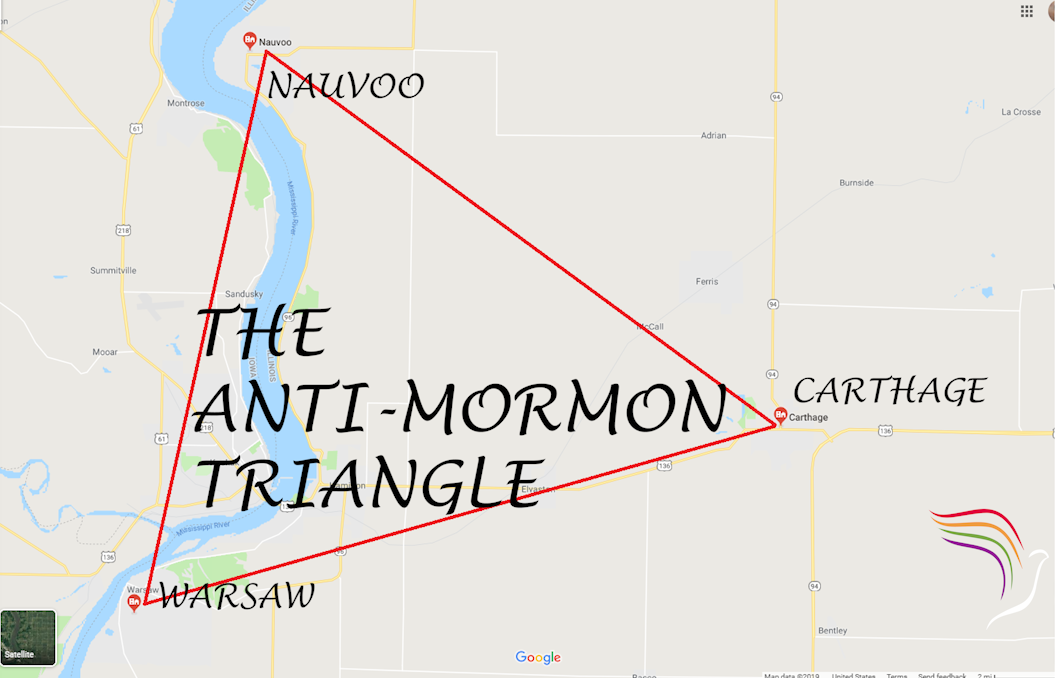Carthage, Nauvoo, and Warsaw, Illinois form a bit of an anti-Mormon Triangle. Most Mormons know about the first 2 cities, but what do you know about the third? In our next conversation, we’ll get acquainted with both Brian Stutzman and Warsaw, Illinois, once a hotbed of anti-Mormon sentiment.

Brian: Before the Saints came to Nauvoo and before Warsaw was even started, there were some tracts of land on both sides of Mississippi. It doesn’t sound politically correct, but on the Iowa side, (Iowa was a territory,) the government set up what was called the Half-breed Tract. Basically, it was for people that would be given land if they had one parent that was Native American, and another one that was a white person. That’s why it was called Half-breed Tract. Well, the government gave this land away. And these Indians, half-Indians, half-breeds, whatever the term was in that time period, they didn’t want it. So land speculators, like I said, Isaac Galland came, and would give them pennies on the dollar. He and his land development company had thousands of acres over on the Iowa side by Montrose, which became later the Zarahemla Stake. Well on the other side of the river by Commerce and Hotchkiss which became Nauvoo…
GT: Yeah, Commerce became Nauvoo.
Brian: So the United States government had 3.5 million acres. They had three different tracts. They called them military tracts, or bounty tracts, and basically, after the War of 1812, the United States government owed soldiers back pay. They didn’t have any money, but they had all this land on the western frontier. That’s what this military tract was. Essentially, if you were a soldier in the War of 1812, you would get 160 acres in one of these three military tracts. One of them came through western Illinois. It covered 12 counties. Like I said, it’s 3.5 million acres, so it’s sizable. Well, the soldiers up in New England didn’t want to move. Some of them didn’t want to move, at least to Western Illinois, so they would sell their land for pennies on the dollar. So Isaac Galland and other land speculators had land on both sides of the Mississippi and they heard about Joseph Smith being in Liberty Jail, and he wrote him and said, “If you’re looking for a place for your people, I’ll make you a deal–nothing down….” That’s one reason I think the saints moved to Quincy and then on up as soon as Joseph escaped from Liberty to go up to Nauvoo.
Brian is the first person to write a history of Warsaw, and we’ll learn more about the dynamics that led to people of that city to storm the Carthage Jail and kill Joseph Smith, Jr. Brian also had an interesting experience!
Brian: I later became really good friends with the mayor, Tiffany Murphy and her husband Chris Bass. They had me over for dinner multiple times, took me out on the river. It was really cool. My experience with Warsaw not only on my multiple trips back because I was doing research for this book, but an apex of it was spending two nights in the bedroom of Thomas Sharp.
GT: There you go.
GT: Oh wow.
Brian: Now my wife says, “Is kind of like staying in the bedroom of Hitler or something? Was it dark? Was it positive?”
Thomas Sharp was editor of the newspaper and leader of the mob that stormed the jail in Carthage. We’ll talk about him quite a bit over the next few weeks. We’ll also talk about the events that led to a big rivalry between Nauvoo and Warsaw. Check out our conversation….
 Carthage, Nauvoo, and Warsaw formed an anti-Mormon triangle that led to the prophet Joseph Smith’s death. Brian Stutzman has written the first history of Warsaw, Illinois.
Carthage, Nauvoo, and Warsaw formed an anti-Mormon triangle that led to the prophet Joseph Smith’s death. Brian Stutzman has written the first history of Warsaw, Illinois.
If you’re interested in Joseph Smith, don’t miss our conversations about the First Vision!
292: First Vision Conflicts (Vogel)
291: 1835 Account of First Vision (Vogel)
290: Making a Case for Melchizedek Priesthood in 1831? (Vogel)
289: Methodist Visions (Vogel)
Podcast: Play in new window | Download (Duration: 20:16 — 37.3MB) | Embed
Subscribe: Email | | More
